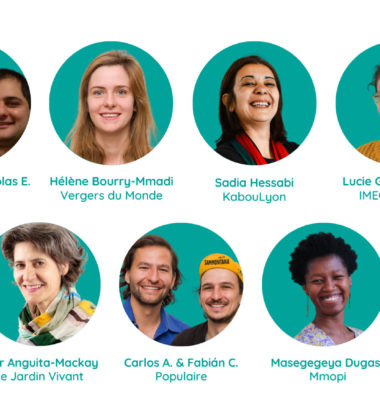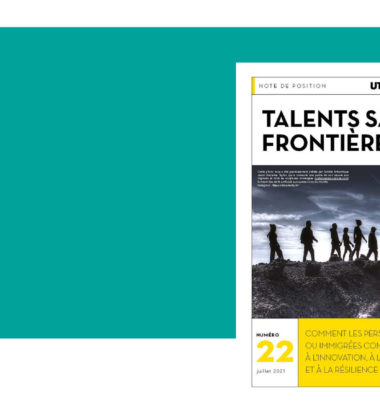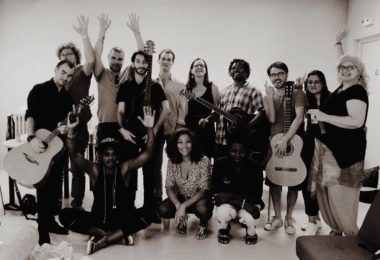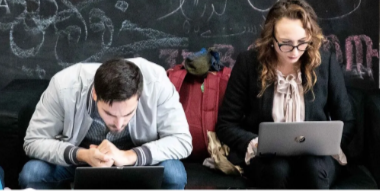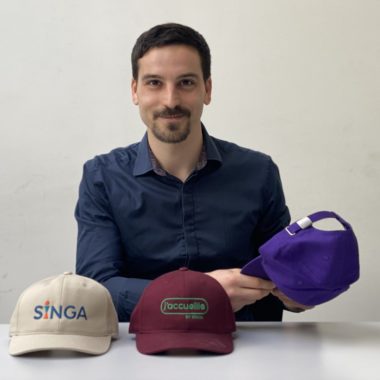Migration | February 24th, 2023
Share this
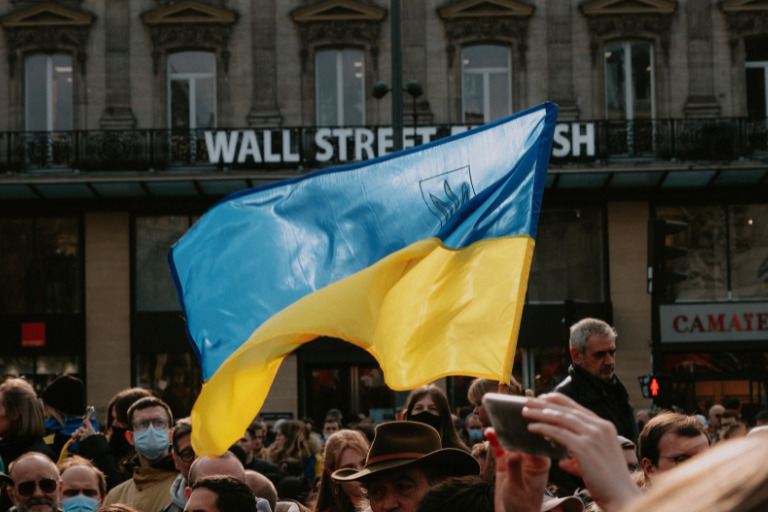
Temporary protection, perception of newcomers, progress in migration policies… one year after the start of the war in Ukraine, Amer Alqadi, board member of SINGA Global (based in Berlin), Flavia Catacora, Director of SINGA Barcelona, and Benoît Hamon, CEO of SINGA Global (based in Paris), reflect on the past year and share their perspectives.
The war in Ukraine started a year ago, with more than 8 million people displaced ౼ how has the subject of migration evolved since ?
Benoît Hamon: The European Union adopted the “Temporary Protection” directive, which considerably facilitated the work of NGOs. This protection allowed all public and private actors to align and expedite the inclusion of displaced Ukrainians by immediately granting them the right to work, access to housing, healthcare, and employment. In parallel, these actors mobilized hundreds of millions of euros to successfully include displaced persons from Ukraine. Therefore, today, there is not a single Ukrainian person sleeping on the streets in European countries. The European Union has demonstrated that when it has the willingness to successfully include, it has the capacity to do so. This proves that political will is the key factor for Europe’s inclusion capacity. This precedent justifies our demand for the generalization of this directive to all conflicts that pushes thousands of persons on the roads of exile.
This crisis has also led to a certain awareness and a surge of solidarity within local populations about what it means to be in exile, to leave everything behind overnight… We hope that this will open people’s minds to the experiences of all people in exile and that this solidarity will continue over the long term, for everyone.
Flavia Catacora: In Spain, Catalonia has been the autonomous region that has welcomed the largest number of Ukrainian refugee persons, officially 36,000 people as of December 2022. The country quickly implemented numerous measures for welcoming and supporting these individuals. This demonstrates one thing: European countries have the capacity to mobilize to welcome newcomers.
This past year has also shown the varying degrees of attention that the European Union gives to migration issues. Its response is rapid when it comes to European populations, so it is a matter of political will rather than a lack of logistical means. Meanwhile, what does not change is the lack of consideration for other migrations and those to come in the context of an increasingly severe climate crisis.
Amer Alqadi : We have witnessed one of the largest waves of immigration in Europe. Governments and populations in the Western world have reacted very differently to this, on multiple levels.
- Governments did not hesitate to welcome all incoming people, regardless of their numbers.
- In Germany, the Ukrainian newcomers were treated differently than “migrants”. They were easily granted work permits, and students without certified secondary school diplomas were allowed to start their university studies, etc.
- The pressure on public policies was so great that the government is still trying to find a place for everyone, in schools and in various infrastructures.
- Within German society, local citizens seem to have been slightly more welcoming to this wave of immigration. We have heard people and governments calling Ukrainians “brothers and sisters”, while referring to people from the Middle East as “potential terrorists”.
- The media has referred to Ukrainian refugees as “civilized”, “white” and “people with Netflix accounts”. Unfortunately, it is clear that skin color plays an important role in perceptions of migration.
- Finally, many initiatives and platforms aimed at recruiting Ukrainian talents have emerged. These are interesting initiatives that we must capitalize on for all newcomers and immigrants.

How has the war impacted SINGA’s work, and what adjustments were made as a result?
B.H.: The Ukrainian crisis has not changed our principles of welcoming. SINGA’s mission remains to accelerate inclusion and reveal the potential of newcomers to enrich society. No discrimination should be made based on origin, religion, or the nature of the crisis that leads to exile. We have had to adapt our programs, particularly by soliciting more interpreters in Russian and Ukrainian.
We have also accelerated the scaling of our citizen hosting program Jaccueille.fr, expanding from four to 10 cities and are in discussions with the French government to expand to 45 cities in France, particularly in semi-rural and semi-urban areas.
F.C.: The populations affected by the crisis in Ukraine and newly arrived on Spanish territory find themselves in a situation of waiting for the evolution of the war in their country, rather than with a perspective of permanent and definitive settlement. The protection permits issued by Spain are temporary, valid for a duration of one year, renewable three times. When it comes to migration and entrepreneurship: people start a project when they have been able to solve certain necessities such as housing, language, administrative procedures… In our incubation programs, we work on ways to include this population by understanding their specific needs. Currently, we are in contact with a network of associations and organizations that work in direct contact with the Ukrainian populations to determine their specific needs and better accompany them.
What do you hope to see change on this topic to better respond to future migration issues?
F.C.: Beyond the war in Ukraine, the situation in Spain was marked in 2022 by citizen mobilizations for a massive regularization of undocumented individuals present in the territory. This initiative, which collected more than 700,000 signatures, is being processed in the Congress of Deputies at the national level.
Furthermore, we hope for a change in the “Ley de extranjería,” Spanish immigration law, which currently makes the situation precarious for newly arrived individuals. They must remain undocumented for three years before considering “arraigo” or regularization. This means three years of precarity, exposed to the informal economy and exploitation, without any possibility of denouncing abuse, at the risk of deportation.
The consequences for Spanish society are multiple, including the loss of a major economic and fiscal contribution and the “invisibilization” of the contribution of immigrant individuals to the local economy.
Finally, between 2014 and 2020, the European Union allocated 850 million euros to Spain for border management. This management is partly outsourced to a series of companies and organizations that are part of a “migration control industry.” This outsourcing and control model must be ended and become a priority at the European level. We can no longer witness another tragedy like that of Melilla, where collaboration with Morocco is criticized for its failure to respect human rights.
B.H.: The Ukrainian crisis has encouraged coalitions of organizations committed to the inclusion of newcomers to mobilize together to expand the principle of ‘Temporary Protection’ to all migration crises caused by war, famine, and climate disaster. Moreover, this crisis has shown that allowing refugees to work immediately significantly accelerates their inclusion, language learning, and ability to thrive, benefiting everyone. This is what we defend, especially with the French government, which is preparing yet another immigration law. Preventing people from working slows down their inclusion, makes them invisible, and creates multiple problems.
Regardless of the war in Ukraine, migration is drastically scaling up. Therefore, policies, energy, and budgets put towards inclusion must be adapted to scale. The Ukrainian crisis has shown that Europe is capable of mobilizing for inclusion.
A.A.: In general, the system in Germany and other European countries is too short-sighted and does not adequately prepare for welcoming newcomers. There is a lack of real programs aimed at quickly including newcomers. Many measures need to be taken, such as improving immigration laws and involving civil society in the decision-making process. It also seems necessary to raise the public’s awareness about immigration.




